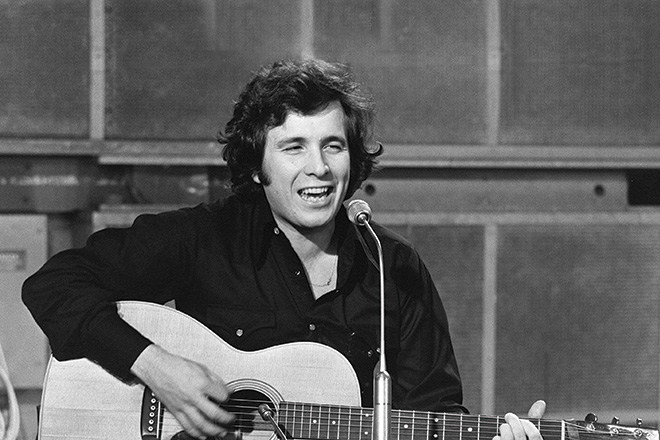“American Pie”
DON MCLEAN
When Don McLean wrote “American Pie” in 1971, he was thinking far beyond the usual scope of a pop song. “I was conscious of the fact that I was trying to create a rock ’n’ roll dream sequence,” said McLean. “But it was way more than rock ’n’ roll. It was about an America that was coming apart at the seams. I was trying to create this song that connected with parts of America that mattered to me, starting with Buddy Holly.
“I wrote the opening part remembering how it was the day I saw the newspaper article about Buddy’s death. Remembering that got me started. A while later, I wrote the chorus. When I did the chorus, I came up with the title and thought, ‘Oh, what a great title.’ It’s Apple Pie, and parts of the pie. We’re always talking about the economic pie, and pie has sexual significance as well. Then I didn’t do anything with it for a while, I just sat with it. Then one day, in a blaze of glory, I wrote the whole thing, and I tied together musical imagery of unspecified meaning with this story about America, but in a dream-like context.”
Basic tracks of the song were recorded in a few takes, with backing vocals courtesy of the West 44th Street Rhythm and Noise Choir (an uncredited James Taylor, Carly Simon, Livingston Taylor and Pete Seeger). McLean’s lead vocal proved more difficult.
The eight-and-a-half minute epic, too long to fit onto one side of a 45 single, was divided into A and B sides. But radio stations broke their three-minutes or less rule (as they had for the Beatles’ “Hey Jude” three years earlier) and served up the full “Pie.” By mid-January 1972, it hit No. 1, and was the most talked about song in the country.
Did the title refer to Buddy Holly’s downed plane? Why was the levy dry? What was the significance of the pink carnation? Was the jester Bob Dylan? Or John Lennon? And why was he on the sidelines in a cast? These questions and more were being hotly debated by fans in 1972.
Said McLean, “It was really funny to me that after the song became famous people started becoming so interested in the lyrics, because I was trying to write about America. They were missing the point really by trying to say who’s this and who’s that in the song. But that seems to be the nature of people.”
Though he followed “American Pie” with two successful singles—“Castles in the Air” and the lovely ballad “Vincent”—McLean never duplicated the massive success of his signature tune. There were even rumors that he came to resent the song for its career-eclipsing success and refused to perform it for a while. “I’ve always sung ‘American Pie,’” insisted McLean. “The reason people think that goes hand in hand with the idea I wouldn’t sing it because it was such a burden, since no one can follow up that song. ‘American Pie’ has never been a burden to me and I always sang it.”
In 1999, “Weird Al” Yankovic did a Star Wars–inspired cover of the song, and a year later, Madonna introduced “American Pie” to a whole new generation with her No. 1 cover. McLean approved, calling her version “mystical and sensual” and “a gift from the goddess.”
In recent years, McLean has recorded albums of children’s songs, Western tunes, and a tribute to country music great Marty Robbins. He continues to tour the world—and perform “American Pie.”
–Bill DeMain




comment closed